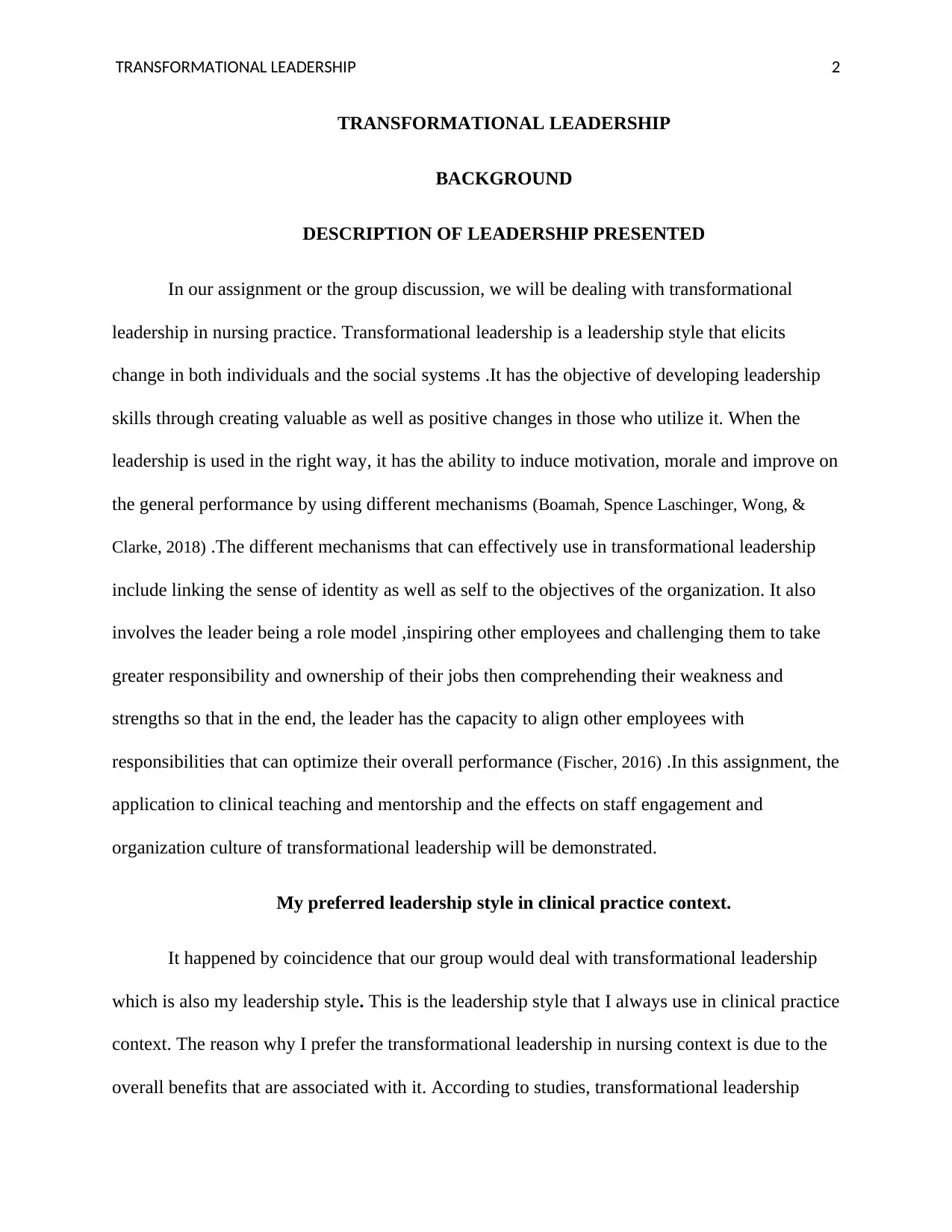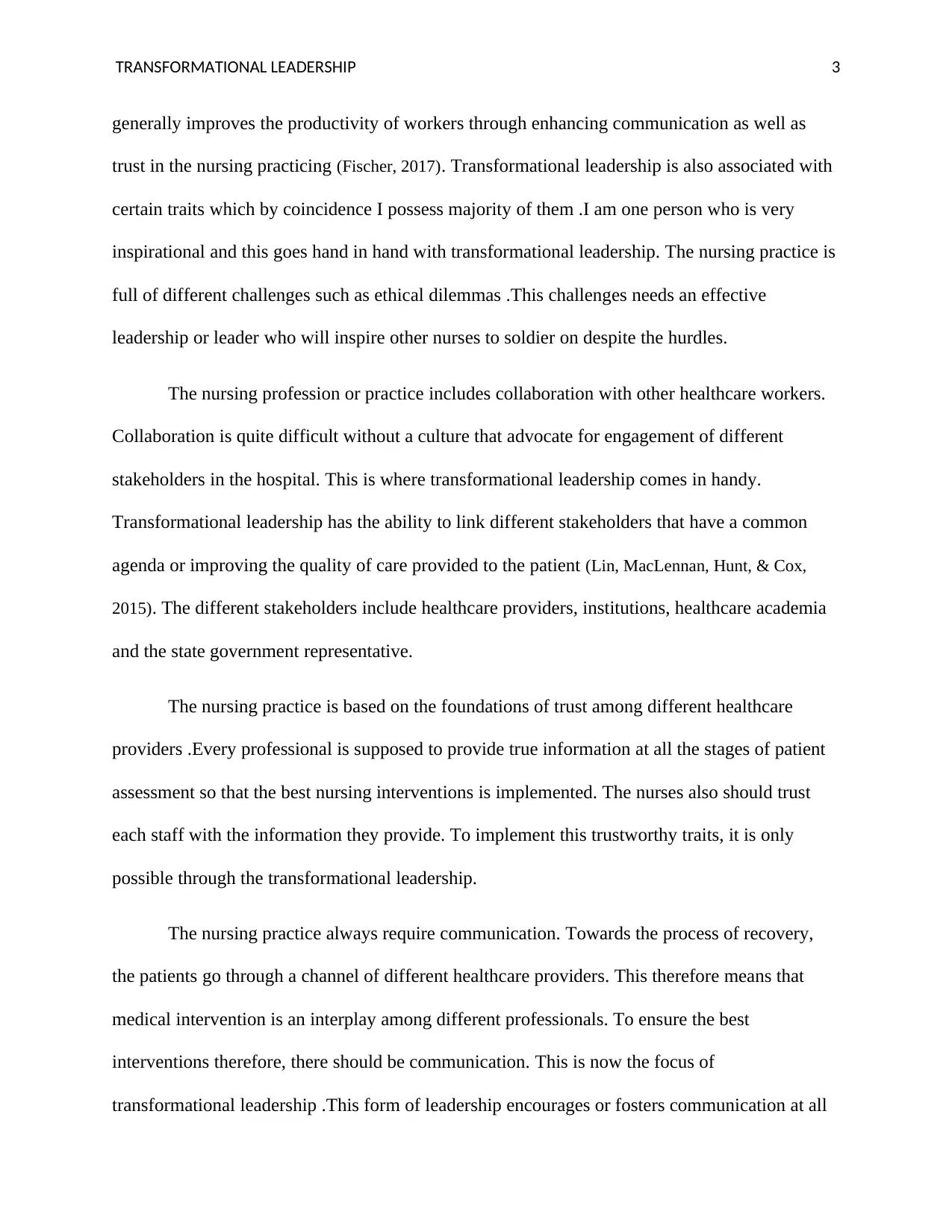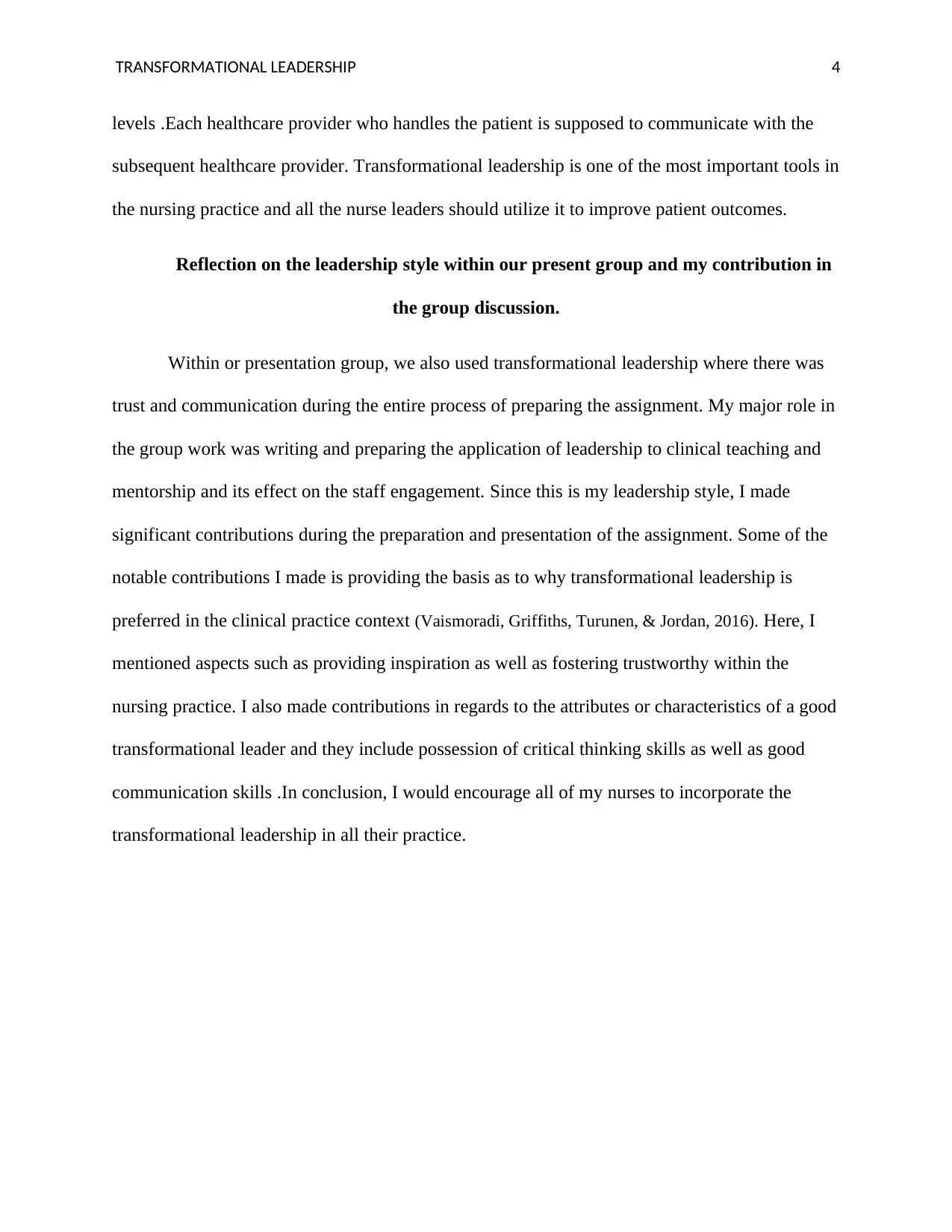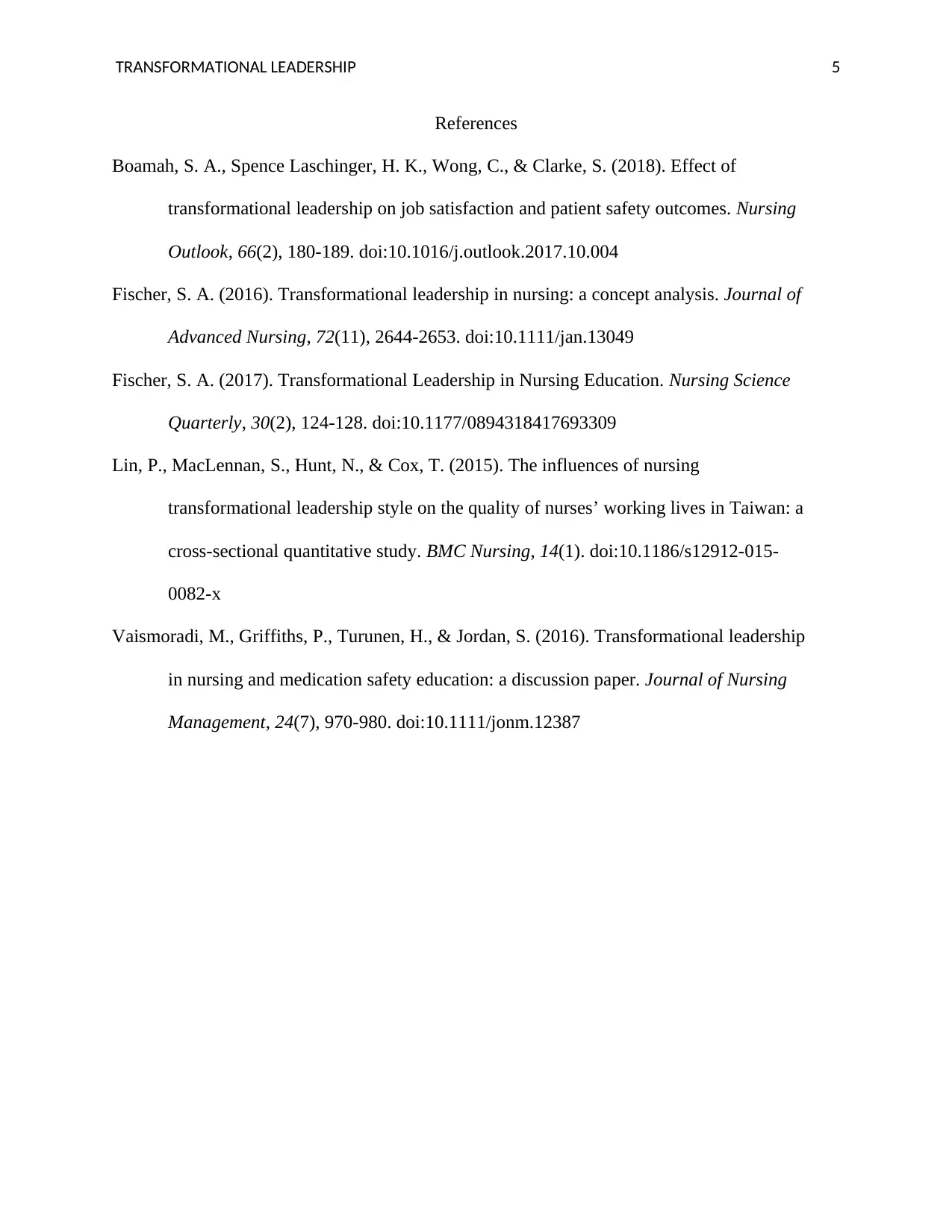Transformational Leadership: Effects on Nursing Practice & Culture
VerifiedAdded on 2023/06/06
|5
|1071
|408
Essay
AI Summary
This essay discusses transformational leadership in nursing practice, highlighting its ability to inspire change, improve morale, and enhance overall performance. It explores the application of transformational leadership in clinical teaching and mentorship, emphasizing its positive effects on staff engagement and organizational culture. The author shares their preference for this leadership style due to its benefits in improving communication, fostering trust, and addressing ethical dilemmas within nursing. The essay also reflects on the author's contributions to a group discussion on this topic, particularly in explaining why transformational leadership is vital in clinical practice. The author encourages nurses to adopt this leadership style to improve patient outcomes.

RUNNING HEAD: TRANSFORMATIONAL LEADERSHIP 1
Transformational leadership
Name:
Institution:
Tutor:
Date:
Transformational leadership
Name:
Institution:
Tutor:
Date:
Paraphrase This Document
Need a fresh take? Get an instant paraphrase of this document with our AI Paraphraser

TRANSFORMATIONAL LEADERSHIP 2
TRANSFORMATIONAL LEADERSHIP
BACKGROUND
DESCRIPTION OF LEADERSHIP PRESENTED
In our assignment or the group discussion, we will be dealing with transformational
leadership in nursing practice. Transformational leadership is a leadership style that elicits
change in both individuals and the social systems .It has the objective of developing leadership
skills through creating valuable as well as positive changes in those who utilize it. When the
leadership is used in the right way, it has the ability to induce motivation, morale and improve on
the general performance by using different mechanisms (Boamah, Spence Laschinger, Wong, &
Clarke, 2018) .The different mechanisms that can effectively use in transformational leadership
include linking the sense of identity as well as self to the objectives of the organization. It also
involves the leader being a role model ,inspiring other employees and challenging them to take
greater responsibility and ownership of their jobs then comprehending their weakness and
strengths so that in the end, the leader has the capacity to align other employees with
responsibilities that can optimize their overall performance (Fischer, 2016) .In this assignment, the
application to clinical teaching and mentorship and the effects on staff engagement and
organization culture of transformational leadership will be demonstrated.
My preferred leadership style in clinical practice context.
It happened by coincidence that our group would deal with transformational leadership
which is also my leadership style. This is the leadership style that I always use in clinical practice
context. The reason why I prefer the transformational leadership in nursing context is due to the
overall benefits that are associated with it. According to studies, transformational leadership
TRANSFORMATIONAL LEADERSHIP
BACKGROUND
DESCRIPTION OF LEADERSHIP PRESENTED
In our assignment or the group discussion, we will be dealing with transformational
leadership in nursing practice. Transformational leadership is a leadership style that elicits
change in both individuals and the social systems .It has the objective of developing leadership
skills through creating valuable as well as positive changes in those who utilize it. When the
leadership is used in the right way, it has the ability to induce motivation, morale and improve on
the general performance by using different mechanisms (Boamah, Spence Laschinger, Wong, &
Clarke, 2018) .The different mechanisms that can effectively use in transformational leadership
include linking the sense of identity as well as self to the objectives of the organization. It also
involves the leader being a role model ,inspiring other employees and challenging them to take
greater responsibility and ownership of their jobs then comprehending their weakness and
strengths so that in the end, the leader has the capacity to align other employees with
responsibilities that can optimize their overall performance (Fischer, 2016) .In this assignment, the
application to clinical teaching and mentorship and the effects on staff engagement and
organization culture of transformational leadership will be demonstrated.
My preferred leadership style in clinical practice context.
It happened by coincidence that our group would deal with transformational leadership
which is also my leadership style. This is the leadership style that I always use in clinical practice
context. The reason why I prefer the transformational leadership in nursing context is due to the
overall benefits that are associated with it. According to studies, transformational leadership

TRANSFORMATIONAL LEADERSHIP 3
generally improves the productivity of workers through enhancing communication as well as
trust in the nursing practicing (Fischer, 2017). Transformational leadership is also associated with
certain traits which by coincidence I possess majority of them .I am one person who is very
inspirational and this goes hand in hand with transformational leadership. The nursing practice is
full of different challenges such as ethical dilemmas .This challenges needs an effective
leadership or leader who will inspire other nurses to soldier on despite the hurdles.
The nursing profession or practice includes collaboration with other healthcare workers.
Collaboration is quite difficult without a culture that advocate for engagement of different
stakeholders in the hospital. This is where transformational leadership comes in handy.
Transformational leadership has the ability to link different stakeholders that have a common
agenda or improving the quality of care provided to the patient (Lin, MacLennan, Hunt, & Cox,
2015). The different stakeholders include healthcare providers, institutions, healthcare academia
and the state government representative.
The nursing practice is based on the foundations of trust among different healthcare
providers .Every professional is supposed to provide true information at all the stages of patient
assessment so that the best nursing interventions is implemented. The nurses also should trust
each staff with the information they provide. To implement this trustworthy traits, it is only
possible through the transformational leadership.
The nursing practice always require communication. Towards the process of recovery,
the patients go through a channel of different healthcare providers. This therefore means that
medical intervention is an interplay among different professionals. To ensure the best
interventions therefore, there should be communication. This is now the focus of
transformational leadership .This form of leadership encourages or fosters communication at all
generally improves the productivity of workers through enhancing communication as well as
trust in the nursing practicing (Fischer, 2017). Transformational leadership is also associated with
certain traits which by coincidence I possess majority of them .I am one person who is very
inspirational and this goes hand in hand with transformational leadership. The nursing practice is
full of different challenges such as ethical dilemmas .This challenges needs an effective
leadership or leader who will inspire other nurses to soldier on despite the hurdles.
The nursing profession or practice includes collaboration with other healthcare workers.
Collaboration is quite difficult without a culture that advocate for engagement of different
stakeholders in the hospital. This is where transformational leadership comes in handy.
Transformational leadership has the ability to link different stakeholders that have a common
agenda or improving the quality of care provided to the patient (Lin, MacLennan, Hunt, & Cox,
2015). The different stakeholders include healthcare providers, institutions, healthcare academia
and the state government representative.
The nursing practice is based on the foundations of trust among different healthcare
providers .Every professional is supposed to provide true information at all the stages of patient
assessment so that the best nursing interventions is implemented. The nurses also should trust
each staff with the information they provide. To implement this trustworthy traits, it is only
possible through the transformational leadership.
The nursing practice always require communication. Towards the process of recovery,
the patients go through a channel of different healthcare providers. This therefore means that
medical intervention is an interplay among different professionals. To ensure the best
interventions therefore, there should be communication. This is now the focus of
transformational leadership .This form of leadership encourages or fosters communication at all
⊘ This is a preview!⊘
Do you want full access?
Subscribe today to unlock all pages.

Trusted by 1+ million students worldwide

TRANSFORMATIONAL LEADERSHIP 4
levels .Each healthcare provider who handles the patient is supposed to communicate with the
subsequent healthcare provider. Transformational leadership is one of the most important tools in
the nursing practice and all the nurse leaders should utilize it to improve patient outcomes.
Reflection on the leadership style within our present group and my contribution in
the group discussion.
Within or presentation group, we also used transformational leadership where there was
trust and communication during the entire process of preparing the assignment. My major role in
the group work was writing and preparing the application of leadership to clinical teaching and
mentorship and its effect on the staff engagement. Since this is my leadership style, I made
significant contributions during the preparation and presentation of the assignment. Some of the
notable contributions I made is providing the basis as to why transformational leadership is
preferred in the clinical practice context (Vaismoradi, Griffiths, Turunen, & Jordan, 2016). Here, I
mentioned aspects such as providing inspiration as well as fostering trustworthy within the
nursing practice. I also made contributions in regards to the attributes or characteristics of a good
transformational leader and they include possession of critical thinking skills as well as good
communication skills .In conclusion, I would encourage all of my nurses to incorporate the
transformational leadership in all their practice.
levels .Each healthcare provider who handles the patient is supposed to communicate with the
subsequent healthcare provider. Transformational leadership is one of the most important tools in
the nursing practice and all the nurse leaders should utilize it to improve patient outcomes.
Reflection on the leadership style within our present group and my contribution in
the group discussion.
Within or presentation group, we also used transformational leadership where there was
trust and communication during the entire process of preparing the assignment. My major role in
the group work was writing and preparing the application of leadership to clinical teaching and
mentorship and its effect on the staff engagement. Since this is my leadership style, I made
significant contributions during the preparation and presentation of the assignment. Some of the
notable contributions I made is providing the basis as to why transformational leadership is
preferred in the clinical practice context (Vaismoradi, Griffiths, Turunen, & Jordan, 2016). Here, I
mentioned aspects such as providing inspiration as well as fostering trustworthy within the
nursing practice. I also made contributions in regards to the attributes or characteristics of a good
transformational leader and they include possession of critical thinking skills as well as good
communication skills .In conclusion, I would encourage all of my nurses to incorporate the
transformational leadership in all their practice.
Paraphrase This Document
Need a fresh take? Get an instant paraphrase of this document with our AI Paraphraser

TRANSFORMATIONAL LEADERSHIP 5
References
Boamah, S. A., Spence Laschinger, H. K., Wong, C., & Clarke, S. (2018). Effect of
transformational leadership on job satisfaction and patient safety outcomes. Nursing
Outlook, 66(2), 180-189. doi:10.1016/j.outlook.2017.10.004
Fischer, S. A. (2016). Transformational leadership in nursing: a concept analysis. Journal of
Advanced Nursing, 72(11), 2644-2653. doi:10.1111/jan.13049
Fischer, S. A. (2017). Transformational Leadership in Nursing Education. Nursing Science
Quarterly, 30(2), 124-128. doi:10.1177/0894318417693309
Lin, P., MacLennan, S., Hunt, N., & Cox, T. (2015). The influences of nursing
transformational leadership style on the quality of nurses’ working lives in Taiwan: a
cross-sectional quantitative study. BMC Nursing, 14(1). doi:10.1186/s12912-015-
0082-x
Vaismoradi, M., Griffiths, P., Turunen, H., & Jordan, S. (2016). Transformational leadership
in nursing and medication safety education: a discussion paper. Journal of Nursing
Management, 24(7), 970-980. doi:10.1111/jonm.12387
References
Boamah, S. A., Spence Laschinger, H. K., Wong, C., & Clarke, S. (2018). Effect of
transformational leadership on job satisfaction and patient safety outcomes. Nursing
Outlook, 66(2), 180-189. doi:10.1016/j.outlook.2017.10.004
Fischer, S. A. (2016). Transformational leadership in nursing: a concept analysis. Journal of
Advanced Nursing, 72(11), 2644-2653. doi:10.1111/jan.13049
Fischer, S. A. (2017). Transformational Leadership in Nursing Education. Nursing Science
Quarterly, 30(2), 124-128. doi:10.1177/0894318417693309
Lin, P., MacLennan, S., Hunt, N., & Cox, T. (2015). The influences of nursing
transformational leadership style on the quality of nurses’ working lives in Taiwan: a
cross-sectional quantitative study. BMC Nursing, 14(1). doi:10.1186/s12912-015-
0082-x
Vaismoradi, M., Griffiths, P., Turunen, H., & Jordan, S. (2016). Transformational leadership
in nursing and medication safety education: a discussion paper. Journal of Nursing
Management, 24(7), 970-980. doi:10.1111/jonm.12387
1 out of 5
Related Documents
Your All-in-One AI-Powered Toolkit for Academic Success.
+13062052269
info@desklib.com
Available 24*7 on WhatsApp / Email
![[object Object]](/_next/static/media/star-bottom.7253800d.svg)
Unlock your academic potential
Copyright © 2020–2026 A2Z Services. All Rights Reserved. Developed and managed by ZUCOL.





